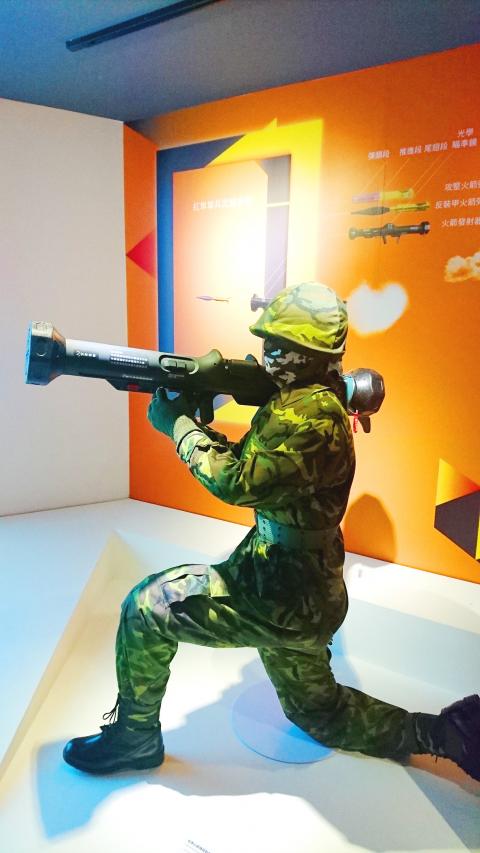Nearly 400 domestically produced Kestrel missiles have been deployed in Taipei to protect key government infrastructure in the event of attacks by China’s People’s Liberation Army, and more missiles would be purchased next year, the Military Police Command said in its annual budget report submitted to the Legislative Yuan yesterday.
The Kestrel missile launcher is a disposable, shoulder-launched, single-shot system that can fire a high-explosive anti-tank warhead or a high-explosive squash head.
The command deployed the first of them in the capital in October as part of a two-year program first announced last year.

Photo: Lo Tien-pin, Taipei Times
It has so far procured 397 missiles, 238 test missiles and five training simulators from the Chungshan Institute of Science and Technology, the command said.
The military has formed the Quick-Reaction Company at the 202nd Military Police Regional Command and garrisoned additional forces in the city, which would allow it to respond quickly in the event of a threat to the central government, the command said.
The missile systems cost NT$43.03 million (US$1.41 million), it said, adding that next year the command plans to purchase 48 more missiles, 40 test missiles and three training simulators, which would cost of NT$5.97 million.
With the lightweight launchers, which could be deployed in high-rises or transported in vehicles, military police can launch mobile counterattacks in urban combat and retake crucial governmental structures, it said.
The missiles could destroy armored vehicles as well as enemy morale, it said.
Its decision to purchase the missile systems was made after carefully considering the “threat posed by the enemy,” the command said.

CHAOS: Iranians took to the streets playing celebratory music after reports of Khamenei’s death on Saturday, while mourners also gathered in Tehran yesterday Iranian Supreme Leader Ayatollah Ali Khamenei was killed in a major attack on Iran launched by Israel and the US, throwing the future of the Islamic republic into doubt and raising the risk of regional instability. Iranian state television and the state-run IRNA news agency announced the 86-year-old’s death early yesterday. US President Donald Trump said it gave Iranians their “greatest chance” to “take back” their country. The announcements came after a joint US and Israeli aerial bombardment that targeted Iranian military and governmental sites. Trump said the “heavy and pinpoint bombing” would continue through the week or as long

TRUST: The KMT said it respected the US’ timing and considerations, and hoped it would continue to honor its commitments to helping Taiwan bolster its defenses and deterrence US President Donald Trump is delaying a multibillion-dollar arms sale to Taiwan to ensure his visit to Beijing is successful, a New York Times report said. The weapons sales package has stalled in the US Department of State, the report said, citing US officials it did not identify. The White House has told agencies not to push forward ahead of Trump’s meeting with Chinese President Xi Jinping (習近平), it said. The two last month held a phone call to discuss trade and geopolitical flashpoints ahead of the summit. Xi raised the Taiwan issue and urged the US to handle arms sales to

BIG SPENDERS: Foreign investors bought the most Taiwan equities since 2005, signaling confidence that an AI boom would continue to benefit chipmakers Taiwan Semiconductor Manufacturing Co’s (TSMC, 台積電) market capitalization swelled to US$2 trillion for the first time following a 4.25 percent rally in its American depositary receipts (ADR) overnight, putting the world’s biggest contract chipmaker sixth on the list of the world’s biggest companies by market capitalization, just behind Amazon.com Inc. The site CompaniesMarketcap.com ranked TSMC ahead of Saudi Aramco and Meta Platforms Inc. The Taiwanese company’s ADRs on Tuesday surged to US$385.75 on the New York Stock Exchange, as strong demand for artificial intelligence (AI) applications led to chip supply constraints and boost revenue growth to record-breaking levels. Each TSMC ADR represents

State-run CPC Corp, Taiwan (CPC, 台灣中油) yesterday said that it had confirmed on Saturday night with its liquefied natural gas (LNG) and crude oil suppliers that shipments are proceeding as scheduled and that domestic supplies remain unaffected. The CPC yesterday announced the gasoline and diesel prices will rise by NT$0.2 and NT$0.4 per liter, respectively, starting Monday, citing Middle East tensions and blizzards in the eastern United States. CPC also iterated it has been reducing the proportion of crude oil imports from the Middle East and diversifying its supply sources in the past few years in response to geopolitical risks, expanding